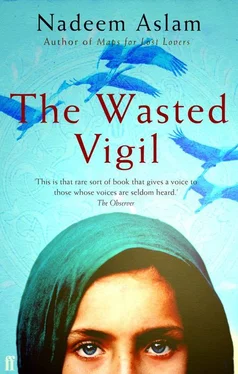Nadeem Aslam - The Wasted Vigil
Здесь есть возможность читать онлайн «Nadeem Aslam - The Wasted Vigil» весь текст электронной книги совершенно бесплатно (целиком полную версию без сокращений). В некоторых случаях можно слушать аудио, скачать через торрент в формате fb2 и присутствует краткое содержание. Год выпуска: 2009, Издательство: Faber and Faber, Жанр: Современная проза, на английском языке. Описание произведения, (предисловие) а так же отзывы посетителей доступны на портале библиотеки ЛибКат.
- Название:The Wasted Vigil
- Автор:
- Издательство:Faber and Faber
- Жанр:
- Год:2009
- ISBN:нет данных
- Рейтинг книги:4 / 5. Голосов: 1
-
Избранное:Добавить в избранное
- Отзывы:
-
Ваша оценка:
- 80
- 1
- 2
- 3
- 4
- 5
The Wasted Vigil: краткое содержание, описание и аннотация
Предлагаем к чтению аннотацию, описание, краткое содержание или предисловие (зависит от того, что написал сам автор книги «The Wasted Vigil»). Если вы не нашли необходимую информацию о книге — напишите в комментариях, мы постараемся отыскать её.
The Wasted Vigil — читать онлайн бесплатно полную книгу (весь текст) целиком
Ниже представлен текст книги, разбитый по страницам. Система сохранения места последней прочитанной страницы, позволяет с удобством читать онлайн бесплатно книгу «The Wasted Vigil», без необходимости каждый раз заново искать на чём Вы остановились. Поставьте закладку, и сможете в любой момент перейти на страницу, на которой закончили чтение.
Интервал:
Закладка:
‘You don’t know what you are talking about. Communism has killed millions upon millions of people …’
‘Let’s just wait until it has killed a few thousand more — the bloodsuckers who control the place I am from — then I’ll be happy to denounce it.’
People like these had to be told that Communism wasn’t the only way to end inequality. ‘We don’t have that kind of people — the priests and landlords — in the United States either …’
‘Then why are your people actually supporting them here, giving them money and weapons?’
As he talked to David he was keeping his voice low: around them were victims of Communism, and David could not imagine what they would do if they heard him talk in that manner. In 1917, one of David’s great-uncles, a copper miner sympathetic to the far-left Industrial Workers of the World, had made known to everyone his opinions about America’s recent entry into the war. He’d call President Woodrow Wilson ‘a lying tyrant’ and denounce US soldiers as ‘scabs in uniform’, unmindful of the fact that the state of Montana, in the grip of patriotic fever, was increasingly intolerant of dissent. During the course of one September night, a small group of masked men grabbed him from his house and left him hanging for all to see at daybreak. A piece of paper with the number of the Montana Vigilantes of the nineteenth century, 3-7-77, was pinned to his body, with the initials of four other men threatened with the same fate.
No, David could not allow this man and his misguidedness to endanger Zameen and the boy.
He could see that the man’s ardour was genuine, but it was directed at falsehoods. David had learnt as much as he could about his great-uncle’s death and had decided that — an outrage and a crime though his hanging was — he could not agree with the man’s views. They would have resulted in the United States becoming entangled in the barbed coils of revolution, like the rest of the countries that had adopted Communism and its offshoots. Revolutions that eventually devoured their children and turned half the planet into a prison. They were the early years of the century and he admired the optimism of people like his distant relative, was even proud to have such a person in his bloodline, someone who cared about equality and justice. But at the opposite end of the century, the consequences were there for all those who wanted to see them. In David’s time, an end to inequality and injustice meant having to contain and undo those outcomes.
‘Just wait until the Soviets are defeated,’ David said. ‘Then we’ll help you Afghans sweep away the landlords and mullahs.’
‘The Soviets are helping us now. Building roads, hospitals, dams — which your people keep destroying.’
They weren’t building anything. It was all either thirdrate or just for show, and either way they were billing Afghanistan millions for it.
‘The Soviets are flying thousands of our children to Moscow to be given free education. If I had a child I’d send him happily.’ And he said that he and a small group of like-minded young men and women had come together and were planning to journey back to Kabul in a few weeks’ time, to offer their services to the Communist regime.
David walked away from him.
And then the next afternoon, Christopher Palantine informed him that the Soviet military would be carrying out an air attack on the refugee camp where the young man lived. The refugee camps of Peshawar were the hub of the anti-Soviet guerrillas, where commanders and warriors came to regroup and recuperate after fighting the Soviet Army in Afghanistan. Tested beyond endurance, the Soviets had violated Pakistani air space to bomb the camps many times before — and that afternoon they would be doing it again.
He and Zameen had kissed for the first time last night, standing in the dark wooden staircase that led to her door, and it was she who had initiated it.
Having learned of the bombing raid in advance, Christopher said, from a mole inside Afghanistan’s spy agency, the CIA had arranged for journalists and television cameras from several major cities of the Western and Muslim world to be present in Peshawar, so that the news and images of the carnage would spread around the world.
He sat under a massive tree with Christopher Palantine, in a saint’s shrine not far from the Street of the Storytellers, the holy man’s grave covered in a lively skin of tiles. He knew there was not enough time to get to the refugee camp and warn the man. So he sat there with his friend and watched the huge crowd in the courtyard before him. They were mostly women. The shrines of the Muslim saints were places journeyed to more by women than men, Zameen had told him, their despair greater, their lacks more essential and urgent. They would come from various places in the land and stay for days around a sacred grave, their saint often the only person in this life they could question with impunity and even accuse of neglect in the language and manner of a wronged lover.
When he got back to his office a note had been slipped under the door. Only he knows how he managed to get to that camp within the sixty or so minutes that remained before the arrival of the Soviet jets. The note, from Zameen, said she’d received word that the boy from her teenage years was living in that refugee camp and she was going there to meet him.
He got there before her, watching her arrive and then leading her and the child away from the site. The place was of course a furnace, smoke issuing from it in enraged billows as though demons had been set free by the bombing. All paths to the part of the camp where the man had his room were impassable, row upon row of burning homes. Leading them away from the deaths of the innocents, he looked over his shoulder. The civilised world would see this and condemn Soviet brutality, Moscow made to rethink its policies.
*
That night David became her lover and within days she was half his world.
*
He watched her pour water onto her shoulder when she bathed, the water spreading in a thin layer on her skin and then breaking up into shapes that resembled countries and islands, resembled continents. She lifted her hair, revealing the length of her neck, and said she and her school friends had been shocked when the prince climbed up the rope of Rapunzel’s hair. ‘We had all read Ferdowsi’s Book of Kings . When the daughter of the ruler of Kabul lets down her hair from a high window, her suitor Zal is unable to bear the thought of using it as a substitute rope.’
The only part of him that seemed alive was where the two of them came into contact. There was no way of identifying many of the bodies after the bombing but it was certain that no one who lived in the bombed part could have survived. And yet initially he remained afraid that the other man would turn up, recognise David and expose his deception. He had already asked her to marry him. They would keep looking for Qatrina and Marcus. And when the Soviets were defeated and Afghanistan was at peace — and her parents were back in the house over there in Teardrop — David, Zameen and Bihzad would move to the United States.
She said her father’s sense of smell was so acute he could discern a word written with colourless perfume on a sheet of paper.
The CIA required that he declare anyone with whom he had regular contact for more than six months. Soon that period was about to pass and he would have to mention her in the report he filed, though he had swept her place and knew there was no need to put her to the trouble of being under an investigation. The Agency also made the recruits sign a paper saying they wouldn’t mention to their spouses the true nature of their work, but he didn’t know of anyone who didn’t tell everything to his wife or husband — easier than having to explain those late-night meetings with agents.
Читать дальшеИнтервал:
Закладка:
Похожие книги на «The Wasted Vigil»
Представляем Вашему вниманию похожие книги на «The Wasted Vigil» списком для выбора. Мы отобрали схожую по названию и смыслу литературу в надежде предоставить читателям больше вариантов отыскать новые, интересные, ещё непрочитанные произведения.
Обсуждение, отзывы о книге «The Wasted Vigil» и просто собственные мнения читателей. Оставьте ваши комментарии, напишите, что Вы думаете о произведении, его смысле или главных героях. Укажите что конкретно понравилось, а что нет, и почему Вы так считаете.












